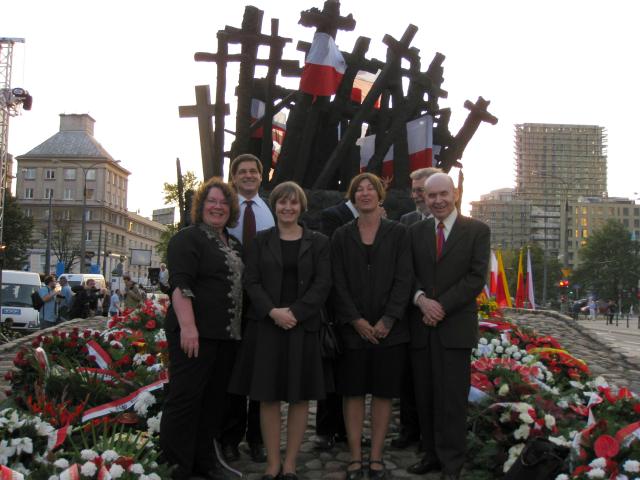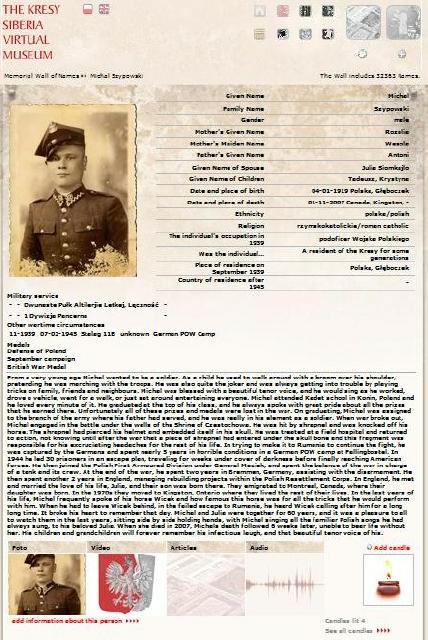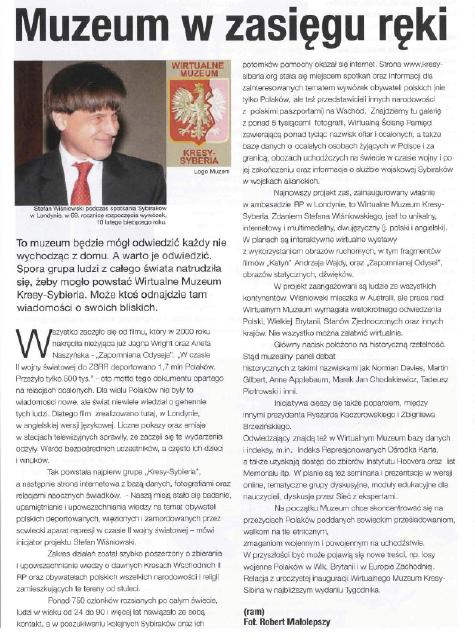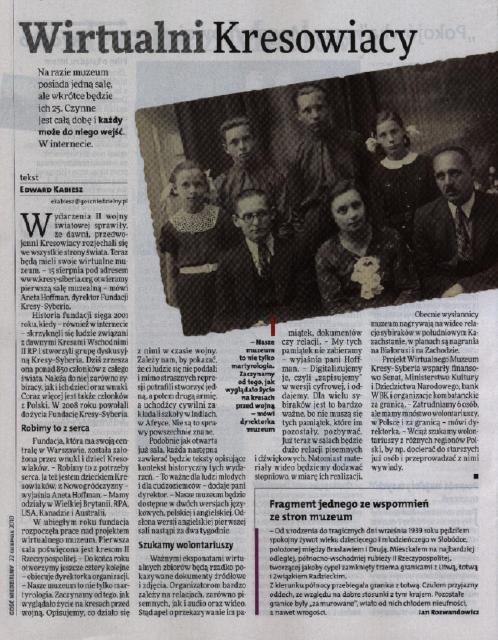| 17 September 2010 – First Anniversary of the Kresy-Siberia Virtual Museum. The Kresy-Siberia Virtual Museum www.Kresy-Siberia.org is celebrating its first anniversary on 17 September with the launch af a new Gallery as well as a revamped website. The “Eastern Borderlands of the Second Republic” gallery is the first of 25 special thematic galleries to be presented in the internet-based museum. It describes life in the Kresy in the 20 years between the end of First World War, when Poland regained its independence after 150 years of occupation, and the start of the Second World War which brought that independence to an end for the next 50 years.
www.Kresy-Siberia.org
The Kresy-Siberia Virtual Museum, dedicted to the Polish citizens’ struggles in the Eastern Borderlands and in Exile during World War 2, was launched last year simultaneously in the Polish Senate in Warsaw and in the Polish consulates in London, Sydney, Washington and Toronto. The launch date marked the 70th Anniversary of the Soviet invasion of Poland on 17 September 1939, acting in unholy alliance with Nazi Germany’s invasion that started World War 2 two weeks prior.
2001 – Birth of the Kresy-Siberia Group
The Kresy-Siberia Virtual Museum is presented by the Kresy-Siberia Foundation, an international non-profit, non-governmental organisation registered in Warsaw and active throughout the world. The oranisation began as an internet discussion forum known as the Kresy-Siberia Group, founded by Sybirak descendant Stefan Wiśniowski of Sydney, Australia in September 2001 with the aim of “researching, remembering and recognizing the Polish citizens deported, enslaved and killed by the Soviet Union during World War Two.”

Kresy-Siberia Foundation Board members in front of the Monument to those deported to Siberia, Warsaw 17 Sept. 2009 |
Most of the original members were the children of Second World War survivors of the Soviet occupation of Poland’s eastern Borderlands (the “Kresy”) now living in the West. Upon reaching middle age, this Second Generation began seeking to understand what their elders had lived through. A good number of the original members were also survivors of being deported into the depths of the Soviet Union themselves, providing much needed “eye witness” recounts of the war.
First and foremost the younger members of the group, the Survivor’s children and grandchildren, had to educate themselves about the Kresy provinces and the fate of their relatives. Both in the West and in Communist Poland, this aspect of the war was not taught, and in many families was not even discussed. As a result, few of the Second Generation even knew their own family history.
Group members also began a search for archival information scattered in poorly accessible archives around the world as well as in the hands of the post-war Polish Diaspora themselves. They researched life in the Kresy prior to the war, the fate of its citizens in the Kresy and in exile during the war, and their destinies after the war. The group amassed, digitized and downloaded thousands of photographs, documents and memoirs to its website, and formed close contacts with many of the Polish archives and museums around the world.
The Kresy-Siberia Group has always been multi-ethnic and multi-religious. The Second Republic of Poland prior to World War II was a multicultural state and our group chose to reflect this value. The group continues to pride itself on bringing together the younger and the oder generations, Poles in the emigration with those in the country, and the citizens of the Second Republic of Poland of all national and religious groups. The group is also truly bilingual, with many native English-language speakers of Polish heritage focussed on educating the Western world, and native Polish-speakers furthering the important education and commemoration work in Poland itself. The group’s membership of nearly 1,000 today includes not just the survivors and their children and grandchildren but also experts in Polish history, archivists and politicians.

Virtual Memory Wall |
2008 – Creating the Kresy-Siberia Foundation
By 2008, the group’s collection of websites had grown significantly, with over 5,000 photographs and 35,000 messages. Membership had grown to more than 700 in over 20 countries, and was increasing rapidly as word of the group spread. However, in order to take the organisation to the next level and to attract serious funding, a more formal organisation was required. The group’s leadership therefore established the Kresy-Siberia Foundation in Warsaw on 28 November 2008.
The Foundation’s team is led by President Stefan Wiśniowski of Sydney, with an international Executive Committee including Aneta Hoffmann and Tadeusz Kościnski in Poland, Krystyna Szypowska in Canada, Louise Błażejowska in Sydney, Prof Witold Łukaszewski in Texas, and Jerzy Neisser in Manchester England.
Branches of the Foundation also also set up around world, and those in Australia, the UK and the USA have been granted tax-deductible charity status to offer income tax receipts to local donors. The branches are headed in in Australia by Stefan Wiśniowski, Louise Błażejowska, Frances Gates, Lucyna Artymiuk and Helena Czechowska-Gullotti; in Canada by Henry Sokołowski, Krystyna Szypowska, Krystyna Piotrowska-Freiberger and Sabina Posądziejewski; in Great Britain by Jurek Neisser, Monica Janowski, Ryszard Grzybowski, Eva Szaegidewicz and Martin Stepek; and in the USA by Eugeniusz Bąk, Witold Łukaszewski, Lisa Frac, Ted Kowalski, Maria Szonert-Bienienda, Jan Marek Chodakiewicz, and Franciszek Herzog.

Virtual Museum - a publication in London "Tygodnik" |
2009 – The Launch of the Kresy-Siberia Virtual Museum
The Kresy-Siberia Virtual Museum was launched to promote research and remembrance of the Kresy and the strugles of its peoples during World War 2, as well as those of all the Polish citizens fighting in Exile for freedom during World War 2, a great many of them from the Kresy and victims of Soviet repression.
With Foundation President Stefan Wisniowski opening the Museum in Warsaw, the Sydney launch was hosted by Consul-General Daniel Gromann, and attended by Kresy-Siberia (Australia) Director Frances Gates, as well as NSW Polish Community Asociation President Jerzy Krajewski and NSW House Speaker John Aquilina.
The launch of the Museum on 17 September 1939 marked the start of a new chapter in the history of the Kresy-Siberia Foundation. From this point the group is in a building phase, collecting Survivor Testimonies by videotaping the youngest survivors while they are still with us, and organising the exhibits in the Public Galleries with the aid of curators and historians.
At the core of the Foundation, the Kresy-Siberia Virtual Museum serves not only to preserve the group’s collections, but also includes the collections and scholarly works of many individual historians, active research institutes and archives around the world. It acts as a very accessible window into this poorly known history and a base for educational programs to be developed.
The Virtual Museum benefits from the advice, support and endorsement it receives from key public figures. Its Honorary Patrons are Bogdan Borusiewicz, Speaker of the Senate of Poland and Radosław Sikorski, Poland’s Minister for Foreign Affairs. Sadly, two of its Honorary Patrons died in the Smolensk Presidential Airplane crash in April 2010: Ryszard Kaczorowski, the last president of the Polish Government-in-Exile, and Janusz Krupski, Poland’s Minister for Veterans Affairs. Its honorary chaplains are Father Lucjan Królikowski, who personally brought a shipload of Polish orphans from Africa to freedom in Canada, and Michael Schudrich, the Chief Rabbi of Poland.
Well known experts advising the exhibit development crew and ensuring the accuracy of the information presented, include “GULAG” author Anne Applebaum, historian Sir Martin Gilbert, and Professors Norman Davies, Janusz Cisek, Mieczysław Biskupski, Marek Jan Chodakiewicz, Tadeusz Piotrowski, Ewa Thompson and Piotr Stachura.
Important institutions have also agreed to partner with the Kresy-Siberia Foundation and to share their collections. The Virtual Museum is collaborating with the Hoover Institution at Stanford USA, the Piłsudski Institute of New York, the Polish Army Museum in Warsaw, the Institute of National Remembrance (IPN) in Warsaw, the Polish Institute and Sikorski Museum in London, the Memorial Society in Moscow, and organizations such as the Association of Borderland Settlers (Warsaw and London) the Polish Combatants Association (England and Canada), and the Związek Sybiraków (Siberians’ Association) in Wrocław, Poland.
The Foundation seeks support and contributions – including time, talent and financial support – in order to complete this work to honour the Polish citizens who so heroically struggled for freedom and for life itself in the eastern Borderlands and in exile outside their beloved Poland during the Second World War.
Please contact Stefan Wisniowski by e-mail at Stefan.Wisniowski@Kresy-Siberia.org or write to 3 Castle Circuit Close, Seaforth, NSW 2092 Australia, telephone +61 411 864 873.

Another publication in "Gosc Niedzielny" Weekly |
An interview with Stefan Wisniowski the President of "Kresy-Siberia" Foundation (audio, in Polish)- click here
| 

